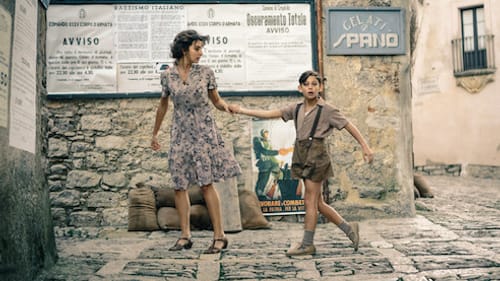Stay in the Loop
BSR publishes on a weekly schedule, with an email newsletter every Wednesday and Thursday morning. There’s no paywall, and subscribing is always free.
Mussolini meets the mob
Pierfrancesco Diliberto's (Pif) 'In Guerra per Amore' at Lightbox Film Center

If I were to pitch a comedy set in WWII Sicily to just about any film studio I would be laughed out of the office, but so it is with writer/director/actor Pierfrancesco Diliberto’s In Guerra per Amore, screening one night only at the Lightbox Film Center's New Italian Cinema Festival.
The film tells the story of Arturo (Diliberto), a love-struck Italian immigrant who enlists with the U.S. Army so he can travel back to Sicily to ask his girlfriend Flora’s (Miriam Leone) father for her hand in marriage. To complicate matters, Flora’s uncle has arranged for her to marry the son of a local Italian-American crime boss. The boss, Don Tano (Mario Pupella), learns of Arturo’s plot and puts a hit on him with the Sicilian mafia. As one of the only Sicilian speakers amongst the invading U.S. force, Arturo finds himself caught between mobsters, fascists, and an Allied Occupation intent on winning the island at any cost.
A Sicilian story
Diliberto (known as Pif to Italian audiences), a Palermo native, has made quite a career out of mafiacentric entertainment. He cut his teeth as assistant director on anti-mafia film I Cento Passi, and hosted a series of mafia-related television programs. His debut film, The Mafia Kills Only in Summer (which he also co-wrote and starred in), offers a similarly satirical take on the 1970s Sicilian mafia. That film conveys a love/hate acceptance of organized crime as a fact of life at the time. In Guerra per Amore goes one step further in explaining how the mafia was empowered by the Allied Occupation to become deeply entrenched in Sicilian society.
It is important to distinguish that this film is not just Italian, but also Sicilian. Much of the language is in Sicilian dialect, and even the film’s other Italian speakers find it hard to relate to the cultural specificity of these Sicilian ways. As such, the film does an excellent job of contextualizing Sicily’s unique position as a frequently conquered island kingdom. The 1943 Allied Occupation was only the last in a history beginning with the ancient Greeks.

The film also provides a glimpse of the complex relationship between the mafia and Sicilian society. It acts as an intermediary between the people and each successive conquering army – at least, that’s the narrative mafia boss Don Calo (Maurizio Marchetti) offers. Don Calo demonstrates this point as the camera pans between a portrait of Mussolini and the cross, and he nonchalantly remarks, "In this town, who decides who lives or dies, is me."
Unexpected revelations
It’s a film that rewards the viewer for paying close attention: there are terrific running gags and other, subtler callbacks to earlier details. Fans of Pif’s work will be amused to learn that the lead character shares the same name, Arturo Giammarresi, and love interest, from his first film.
Santi Pulvirenti’s music, however, comes off as kitschy and Woody Allen-esque, but without the signature charm. Often the score seems over the top during serious scenes, as when a mother and young boy realize their husband/father won’t return from the war. The film also undergoes a major, and too-rushed tonal shift in its last 20 minutes. It closes with footage of an archival document written by U.S. Army Captain W.E. Scotten revealing the Allied Occupation’s role in restoring the mafia to power in Sicily and documentary footage of Sicilian-American mobster Lucky Luciano being freed from prison by U.S. authorities.
The film levies some damning accusations against the U.S. occupation, something I did not expect from a comedy, but appreciated learning. Despite its shortcomings, I recommend this film to WWII history buffs, mafia aficionados, and fans of new Italian cinema.
What, When, Where
In Guerra per Amore (At War for Love). By Pierfrancesco Diliberto, Michele Astori, and Marco Martani; Pierfrancesco Diliberto directed. December 3, 2017 at the International House's Lightbox Film Center, 3701 Chestnut Street, Philadelphia. (215) 387-5125 or ihousephilly.org.
Sign up for our newsletter
All of the week's new articles, all in one place. Sign up for the free weekly BSR newsletters, and don't miss a conversation.

 Rob Buscher
Rob Buscher